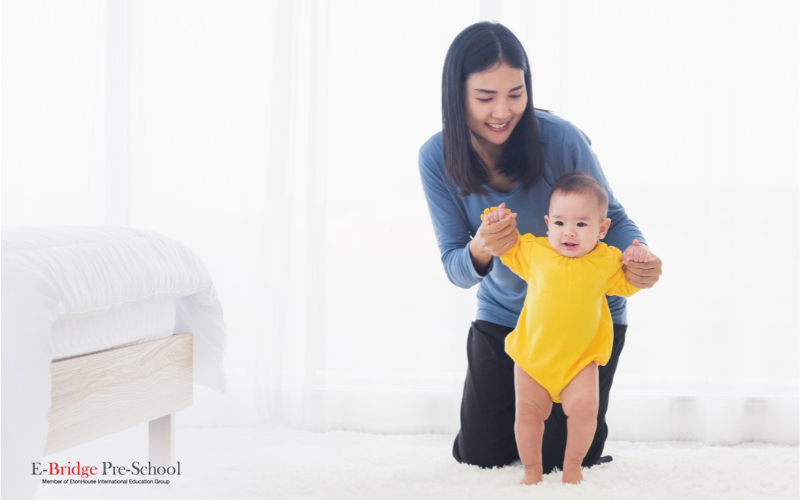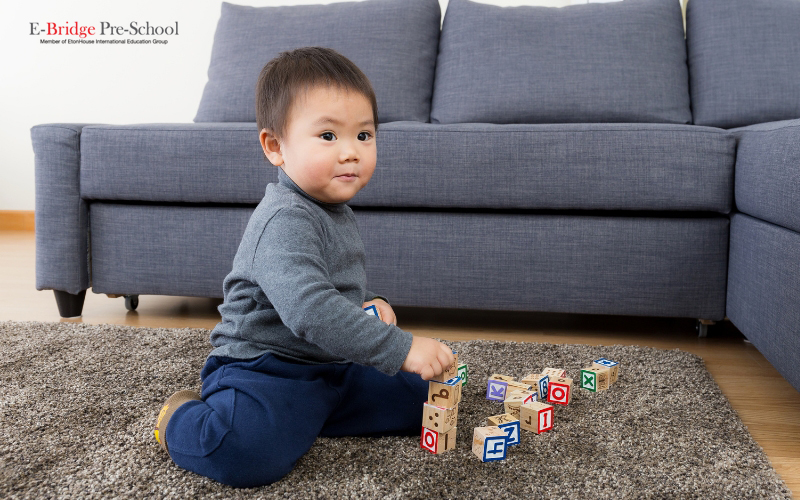.jpg)
E-Bridge Pre-School
E-Bridge Pre-School, part of the trusted EtonHouse Group, is an Anchor Operator and has been in operation since 2014. We provide high-quality childcare with a trusted programme for children aged 2 months to 6 years across 24 centres.
As a new or soon-to-be parent, it is natural not to know what to expect from infant care in Singapore. With the vast amount of information and different perspectives out there, you may quickly feel overwhelmed. Some may also lead to myths about infant care that may cause unnecessary stress and worry.
In this handy guide, we debunk some of the most widespread misconceptions surrounding infant care and help you navigate the world of early childhood with confidence and ease.
Misconception 1: It is unsafe to send my baby to infant care
While it is understandable that you might not bear to part with your child, the truth is that infant care in Singapore offers many fun, exploratory experiences in a safe and enriching environment for your baby.
The fear of germs is one of the biggest concerns many parents have but the best infant care centres take great care to maintain a clean and hygienic environment, following strict protocols for handwashing, diaper changing and cleaning of toys and surfaces. Hence, there is no need to fret that sending your child to infant care makes them more susceptible to illnesses.
Additionally, parent-school communication platforms have revolutionised the way that parents and educators interact, and this is no different in the realm of infant care. With these platforms, parents can now stay informed about their child’s daily routine, development, and overall wellbeing, and can communicate with caregivers easily and efficiently.
Misconception 2: Infant care educators can be replaced by babysitters

Even though both infant care educators and babysitters care for children, there are still significant differences between the two.
A babysitter may have experience or training in childcare, but they typically do not possess formal education or certification in early childhood development. On the contrary, infant care educators are required to complete coursework and training in early childhood education, and many hold degrees and/or professional qualifications in the field. Some of the best infant care in Singapore only hire educators knowledgeable about child development and age-appropriate play and learning.
Another biggest difference would be their approach to care — a babysitter focuses on keeping your child safe and entertained, while infant care educators prioritise creating a nurturing and stimulating environment that supports your baby’s physical, cognitive and emotional development.
Misconception 3: There will always be slots available at infant care
Infant care centres are in high demand in Singapore — in 2021, enrolled children accounted for approximately 77% of the available infant care capacity across the nation and even though this indicates an adequate overall supply, certain regions still experience shortages, resulting in waitlists. The reality is that demand often exceeds supply, and this is usually due to reputable centres having strict ratios of educators to infants, limiting the number of children they can accommodate.
Many parents start researching and applying months in advance so it is advisable for you to start early — talk to other parents, read reviews and schedule visits to get a sense of the quality and availability of different infant care centres near you.
Misconception 4: My baby is too young to learn, so there is no need to send them to infant care

Infant care can play a crucial role in supporting your child’s development through the introduction of age-appropriate toys, games and learning experiences that encourage learning and exploration. Babies who attend infant care have the opportunity to socialise and interact with other children as well, which can promote social and emotional development from a young age.
Misconception 5: My baby will not be given full attention in infant care
Another worry you may have is that your baby will not receive individualised attention in an infant care setting.
The minimum guideline set by the Early Childhood Development Agency is 1:5 for the ratio of educators to infants, but reputable centres adopt a lower ratio to ensure that each child receives personalised attention and care.
Infant care centres in Singapore also provide daily reports or updates on your child's activities, meals, and behaviours, as well as regular opportunities for parent-teacher meetings.
Helping your baby thrive every step of the way at E-Bridge Pre-School
.jpg?width=2000&height=1500&name=Untitled%20design%20(18).jpg)
When it comes to selecting the right infant care in Singapore for your child, it is important to prioritise educators who are committed to developing respectful and responsive relationships, as this is necessary for your baby’s learning and growth in all areas.
Here at E-Bridge Pre-School, we are passionate about providing exceptional care and together with our educators, invite you to learn more about our infant care programme and philosophy.
Give your child the best head start in life.


